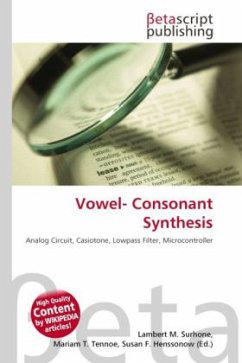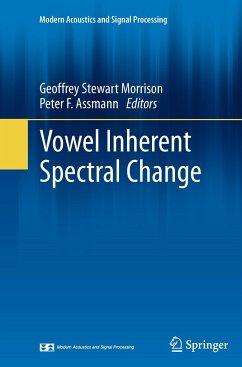
Coarticulatory Vowel Nasalization
Evidence from Modern Greek
Versandkostenfrei!
Versandfertig in 6-10 Tagen
45,99 €
inkl. MwSt.

PAYBACK Punkte
23 °P sammeln!
The focus of this research is the experimentalinvestigation of coarticulatory vowel nasalization indifferent syllabic contexts in Modern Greek. Greekserves as a detailed case study for exploring thehypothesis that the extent of vowel nasalization in alanguage is linked to that language s tendency foropen or closed syllable structure. The study consists of three parts: an overview of thephonetic and phonological facts of Modern Greek withan emphasis on the behavior of nasal consonants andthe syllable structure of the language, an acousticanalysis of coarticulatory vowel nasalization inModern Gr...
The focus of this research is the experimental
investigation of coarticulatory vowel nasalization in
different syllabic contexts in Modern Greek. Greek
serves as a detailed case study for exploring the
hypothesis that the extent of vowel nasalization in a
language is linked to that language s tendency for
open or closed syllable structure.
The study consists of three parts: an overview of the
phonetic and phonological facts of Modern Greek with
an emphasis on the behavior of nasal consonants and
the syllable structure of the language, an acoustic
analysis of coarticulatory vowel nasalization in
Modern Greek, and an assessment of the existing
experimental literature on vowel nasalization in
other languages.
Although more detailed experimental studies are
necessary for a comprehensive evaluation of the above
stated hypothesis, the findings from this work
suggest that investigation of the prosodic
organization of languages may prove fruitful in
determining the factors that lead to cross-language
coarticulatory differences regarding vowel nasalization.
investigation of coarticulatory vowel nasalization in
different syllabic contexts in Modern Greek. Greek
serves as a detailed case study for exploring the
hypothesis that the extent of vowel nasalization in a
language is linked to that language s tendency for
open or closed syllable structure.
The study consists of three parts: an overview of the
phonetic and phonological facts of Modern Greek with
an emphasis on the behavior of nasal consonants and
the syllable structure of the language, an acoustic
analysis of coarticulatory vowel nasalization in
Modern Greek, and an assessment of the existing
experimental literature on vowel nasalization in
other languages.
Although more detailed experimental studies are
necessary for a comprehensive evaluation of the above
stated hypothesis, the findings from this work
suggest that investigation of the prosodic
organization of languages may prove fruitful in
determining the factors that lead to cross-language
coarticulatory differences regarding vowel nasalization.












